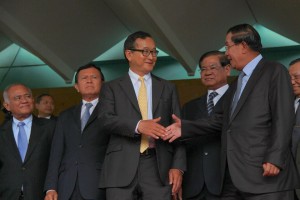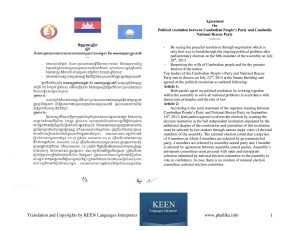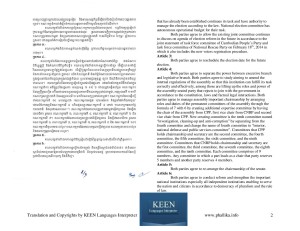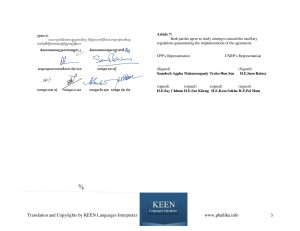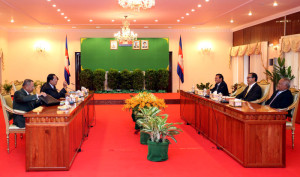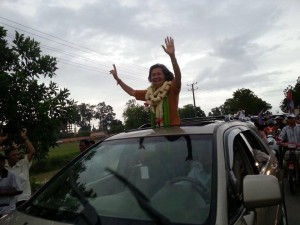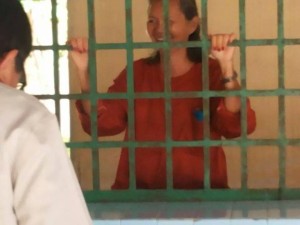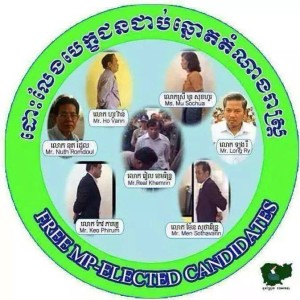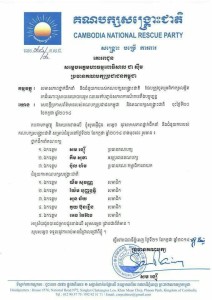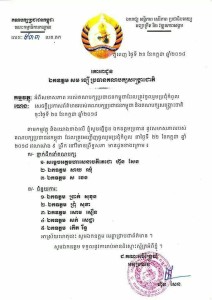១០ជំនាញអ្នកត្រូវមាន ដើម្បីជោគជ័យនៅសតវត្សទី២១នេះ

តើអ្នកត្រៀមខ្លួនហើយឬនៅសម្រាប់ពង្រីក និងពង្រឹងជំនាញរបស់អ្នក? នេះគឺជាសំនួរមួយដែលចោទសួរទៅលើលោកអ្នកឲ្យស្គាល់សមត្ថភាពខ្លួនឯងកាន់តែច្បាស់ សម្រាប់បង្កើនគុណភាពជីវិតតាមរយៈអាជីព។ មិនចំពោះថា អ្នកបានរៀននៅទីណា ពេលណា ពិន្ទុខ្ពស់ក្តី ឬ ទាបក្តីនោះទេ ដរាបណាលោកអ្នកអាចឆក់យកបានសមត្ថភាពទាំង១០ ជំនាញខាងក្រោមនេះ នោះអ្នកនឹងក្លាយជាមនុស្សជោគជ័យលើការអភិវឌ្ឍខ្លួនឯងដែលចាំបាច់ត្រូវមាននៅយុគសម័យបច្ចេកវិទ្យានេះ។
១) សម្របខ្លួនទាន់សភាពការណ៍
ចរន្តសកលភាវូបនីយកម្មបានផ្លាស់ប្ដូរយ៉ាងឆាប់រហ័សក្នុងរយៈពេលដ៏ខ្លីមួយដែលពេលខ្លះអ្នកស្ទើរត្រៀមខ្លួនមិនទាន់។ ស្ថានភាពនេះទាមទារឲ្យអ្នកចេះសម្របខ្លួនទាន់សភាពការណ៍ភ្លាមៗស្របតាមការវិវឌ្ឍនានានៅជុំវិញខ្លួនដោយត្រូវចងចាំថា អ្នកមិនមែនចំណាយពេលច្រើនស្វែងរកអ្វីដែលអ្នកគ្មាននោះឡើយ តែជាការចំណាយពេលស្វែងរកគន្លឹះដើរឲ្យទាន់តាមការផ្លាស់ប្ដូរនោះ។
២) ការបង្កើតថ្មី ឬ ការច្នៃប្រឌិត
ការបង្កើតថ្មីសំដៅលើគោលគំនិតប្រាជ្ញាស្មារតី និងការច្នៃប្រឌិតរបស់អ្នកខុសប្លែកពីរបកគំហើញមុនៗ ដែលមនុស្សមួយចំនួនធ្លាប់ធ្វើនៅពេលកន្លងមក។ ការច្នៃប្រឌិតនឹងធ្វើឲ្យអ្នកក្លាយជាមនុស្សមានសក្ដានុពលម្នាក់ អាចចូលរួមប្រកួតប្រជែងក្នុងកិច្ចការសង្គមបានយ៉ាងជោគជ័យលើសពីអ្វីដែលខ្លួនរំពឹងទុក។ ការបង្កើតថ្មីអាចកំណត់បានថា វាជារឿងមួយមិនអាចទៅរួចសម្រាប់អ្នកដទៃ តែវាអាចទៅរួចសម្រាប់អ្នក ដរាបណាអ្នកមិនបោះបង់ការព្យាយាម។
៣) ជំនាញតស៊ូមតិ
ជំនាញតស៊ូមតិ មិនទាមទារលក្ខខណ្ឌថា អ្នកត្រូវតែពូកែ មានសមត្ថភាពខ្ពស់នោះឡើយ។ ទាំងនេះជាអ្វីដែលអ្នកត្រូវទុកមួយឡែក ហើយចាប់ផ្តើមបញ្ចេញគំនិត ឬ ទស្សនៈផ្ទាល់ខ្លួនរបស់អ្នកបញ្ជ្រាបចូលទៅក្នុងចំណោមមនុស្សម្នាទាំងឡាយ។ លក្ខណៈពិសេសមួយទៀត អ្នកត្រូវមានភាពប៉ិនប្រសព្វក្នុងការបញ្ចុះបញ្ចូលអ្នកដទៃឲ្យជឿជាក់លើអំណះអំណាងរបស់អ្នកដោយធ្វើការសិក្សាលើប្រតិកម្មរបស់ពួកគេ ទន្ទឹមនឹងការថ្លឹងថ្លែងយ៉ាងប្រុងប្រយ័ត្នពីទស្សនៈរបស់អ្នកដទៃ។
៤) ជំនាញពង្រីកកិត្តិសព្ទរបស់ខ្លួនចូលក្នុងសង្គម
ស្របពេលដែលពិភពលោកកំពុងមានឥទ្ធិពលខ្លាំងលើប្រព័ន្ធបច្ចេកវិទ្យាទំនើបៗ ឆ្លៀតក្នុងឱកាសនេះអ្នកអាចកសាងប្រជាប្រិយភាពរបស់អ្នកបានឲ្យមនុស្សទូទៅទទួលស្គាល់ដូចក្រុមហ៊ុនGoogle ឬ Apple ជាដើម។ នេះមិនទាមទារឲ្យអ្នកដើរផ្សព្វផ្សាយពីសមត្ថភាពរបស់ខ្លួននោះឡើយ តែអ្នកអាចប្រើប្រាស់បណ្ដាញសង្គម ដូចជា Facebook, LinkedIn ឬ Twitter ដើម្បីប្រមូលផ្តុំ និងផ្តល់ព័ត៌មានសំខាន់ៗដែលមានគុណប្រយោជន៍ទូទៅសម្រាប់សាធារណជនបាន។
៥) ជំនាញកុំព្យូទ័រ
ជំនាញកុំព្យូទ័រត្រូវបានគេទទួលស្គាល់ថា បានដើរតួនាទីយ៉ាងសំខាន់នៅយុគសម័យបច្ចេកវិទ្យានេះ។ សមត្ថភាពវិជ្ជាជីវៈរបស់អ្នកទោះបីជាមានទំនាក់ទំនងតិចក្តី ច្រើនក្តី មិនអាចគេចផុតពីជំនាញមួយនេះបានឡើយ។ MS-Office, PowerPoint ឬ Excel គឺជាជំនាញគ្រឹះមួយដែលត្រូវបានគេមើលឃើញជាទូទៅថា មានលក្ខណៈចាំបាច់សម្រាប់កិច្ចការប្រចាំថ្ងៃនៅគ្រប់ស្ថាប័ននានា ហើយអ្នកត្រូវដើរឲ្យទាន់កម្មវិធីថ្មីៗដែលបំពាក់លើប្រព័ន្ធកុំព្យូទ័រនេះ។
៦) ជំនាញលើសមត្ថភាពដំណោះស្រាយ
ដំណោះស្រាយបញ្ហា គឺជាជំនាញមួយយ៉ាងពិសេសដែលអាចបង្កើតភាពអស្ចារ្យនៅក្នុងបរិស្ថានការងារ និងជីវភាពរបស់អ្នក។ ទោះបីជាបញ្ហាទាំងនោះ ធំ ឬ តូច ការផ្ដោតលើគន្លឹះជាដំណោះស្រាយគឺជាមូលដ្ឋានគ្រឹះ ជួយជំរុញឲ្យអ្នកក្លាយជាមនុស្សមានឥទ្ធិពលម្នាក់។ ទាំងនេះទាមទារឲ្យអ្នកមានទំនុកចិត្ត ក្លាហាន ហ៊ានប្រឈមមុខនឹងឧបសគ្គ និងមានសុទិដ្ឋិនិយមខ្ពស់ធ្វើយ៉ាងណាប្រែក្លាយរឿងធំឲ្យទៅជារឿងតូចបាន។
៧) ជំនាញលើការសម្រេចចិត្ត
មនុស្សដែលមានសមត្ថភាពក្នុងការសម្រេចចិត្តដ៏ត្រឹមត្រូវទោះបីជាស្ថិតនៅក្នុងកាលៈទេសៈបែបណាក៏ដោយ នឹងមិនសាងប្រវត្តិសាស្ត្រឈឺចាប់ និង និយាយពាក្យថា ស្តាយក្រោយសម្រាប់ខ្លួនឯង ឬ អ្នកដទៃនោះឡើយ។ អ្នកអាចស្វែងយល់ពីស្ថានភាពនោះឲ្យច្បាស់ និងលើកគន្លឹះជាច្រើនមុននឹងធ្វើការសម្រេចចិត្តដោយភាពជឿជាក់ព្រមទាំងព្យាយាមធ្វើវាឲ្យសាមញ្ញ និងងាយស្រួលតាមអ្វីដែលខ្លួនអាចធ្វើបាន។
៨) ជំនាញវិភាគវែកញែក
ជីវិតពិតជាពោរពេញទៅដោយឧបសគ្គ និងបញ្ហាជាច្រើនដែលកើតមានជាបន្តបន្ទាប់ ដែលនេះទាមទារឲ្យអ្នកមានជំនាញយ៉ាងពិសេសមួយទៀតដើម្បីជីកឫសគល់បញ្ហាទាំងនោះ គឺជំនាញវិភាគវែកញែក។ ដំណោះស្រាយជាច្រកផ្លូវ ឬ អំណះអំណាងដ៏ត្រឹមត្រូវរបស់អ្នកកើតចេញពីការវិភាគបញ្ហាទាំងនោះ នឹងពាំនាំមកនូវទំនុកចិត្ត និង ភាពជឿជាក់ អាចបង្កើនសមត្ថភាពវិជ្ជាជីវៈរបស់អ្នកឲ្យដើររលូតឆ្ពោះទៅមុខជានិច្ច។
៩) ជំនាញគ្រប់គ្រងពេលវេលា
ការគ្រប់គ្រងពេលវេលាឲ្យមានប្រសិទ្ធភាព ជាមួយនឹងការប្ដេជ្ញាចិត្តខ្ពស់ ដើម្បីការផ្លាស់ប្ដូរ គឺជាផ្នែកមួយយ៉ាងសំខាន់មានឥទ្ធិពលគ្រប់ស្ថានភាពទាំងអស់នៅក្នុងជីវិត។ វាហាក់បីដូចជា រឿងងាយស្រួលដើម្បីបំប៉នខ្លួនអ្នកឲ្យមានជំនាញនេះ ប៉ុន្តែវាមិនដូចអ្វីដែលអ្នកគិតនោះឡើយ។ វិធីសាស្ត្រដ៏ល្អដើម្បីអនុវត្តចំណុចនេះ គឺត្រូវរៀបចំគម្រោងបែងចែកកិច្ចការរបស់អ្នកឲ្យបានត្រឹមត្រូវ និងច្បាស់លាស់ ហើយចាប់ផ្តើមធ្វើវាភ្លាមៗដោយមិនរារែកអ្វីទាំងអស់។
១០) ជំនាញទំនាក់ទំនង
ការទំនាក់ទំនងគឺជាជំនាញពិសេសមួយទៀតដែលអ្នកត្រូវមាន ហើយការងារដែលមានប្រសិទ្ធភាព យ៉ាងពិតប្រាកដពិតជាមិនអាចកើតមាននោះឡើយ ដរាបណាអ្នកគ្មានវាកាន់នៅក្នុងដៃទេនោះ។
ការប្រាស្រ័យទាក់ទងតាមរយៈការសរសេរ ស្តាប់ និង ការសន្ទនាយ៉ាងយកចិត្តទុកដាក់ជាមួយមនុស្សនៅជុំវិញខ្លួន នឹងជំរុញឲ្យជំនាញទំនាក់ទំនងរបស់អ្នកមានសក្ដានុពលកាន់តែខ្លាំងឡើង។ ក្រៅពីនោះអ្នកនឹងអាចកសាងបានអត្ថប្រយោជន៍ជាច្រើនទៀតផងដែរ ដូចជា ជំនាញឧទ្ទេសនាម (Presentation) ភាពជឿជាក់ និងទំនុកចិត្តពីគ្រប់មជ្ឈដ្ឋាន៕
ប្រែសម្រួល៖ ខេវិន
ប្រភព៖ listdose

